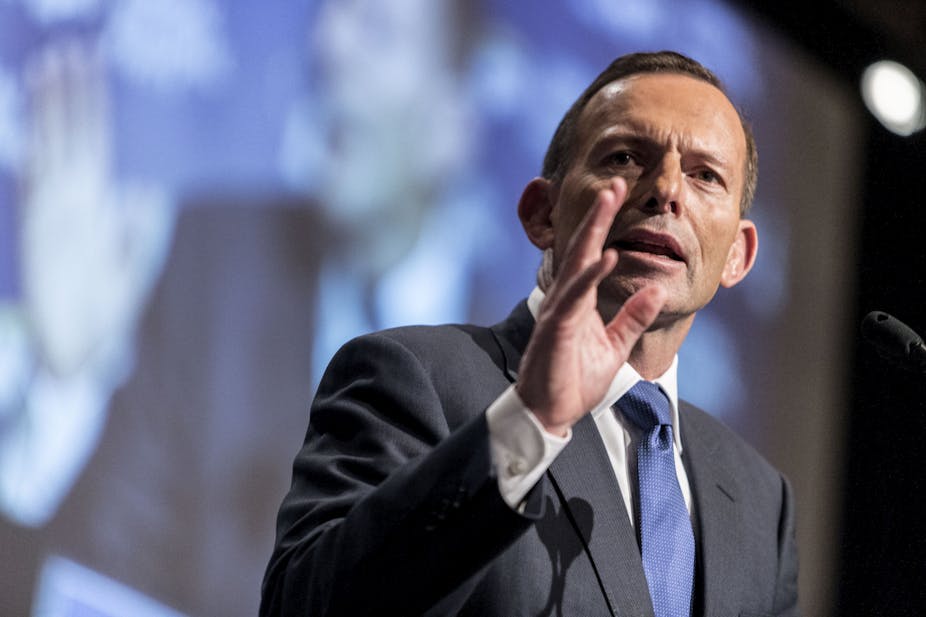Prime Minister Tony Abbott seems to have brokered some kind of peace deal with the ABC over his ban on frontbenchers appearing on Q&A. But there are at least six problems with this picture.
On Friday, it was reported that Abbott would:
… drop the directive for his frontbenchers to boycott the ABC’s Q&A program if the ABC moves the program into its News and Current Affairs division.
These reports followed an exchange of letters between Abbott and ABC chairman James Spigelman.
Six reasons it’s no peace offering
The following morning in The Weekend Australian, Dennis Shanahan smoothly picked up the ball and wrote:
Such a shift will impose much more rigorous demands on Q&A in regards to balance and editorial ethics than currently apply.
Abbott would have welcomed this line. It provides at least a fig leaf for the backing away from his boycott.
But this is a fig leaf blown away by the gentlest of breezes. There is no difference between the editorial policies that apply to news and current affairs programs and those that apply to other television programs on the ABC.
The ABC has had in place extensive editorial policies for many years. They are regularly revised, most recently in August 2013. The opening paragraph of the 22-page document reads:
The ABC Editorial Policies apply to all content produced, commissioned, acquired or otherwise obtained by the ABC for broadcast or publication by the ABC on platforms and through services operated by the ABC, or by the ABC on platforms and through services operated by third parties.
It is true that television programs are subject to a long-standing classification system the grades programs ranging from General to Parental Guidance to Mature and finally Mature Audience. However, news and current affairs programs are excluded from this system. The system aims to:
Ensure all domestic television programs – with the exception of news, current affairs and sporting events – are classified and scheduled for broadcast in accordance with the ABC’s Associated Standard on Television Program Classification.
What does that mean? Well, if the government is worried about potentially inflammatory material on national security issues being discussed on the ABC, moving the program into the news and current affairs division would take it outside the classification system. I’m not sure that’s what the government was aiming for.
It is difficult to work out Abbott’s strategy in his ongoing war with the ABC and Q&A. It appears to have been astonishingly cack-handed for a number of reasons.
Q&A will be subject to the same editorial policies, regardless of the division of the ABC it is placed in.
The division of the ABC that The Weekend Australian says will impose “much more rigorous demands” on Q&A is the same division that Abbott, government MPs and News Corp have vociferously accused of left-wing, inner-city bias.
Abbott’s suggestion to shift Q&A, made in a letter to the ABC’s chairman, is a clear case of attempting to interfere with the ABC’s independence, which is enshrined in legislation. He wrote:
In discussion with the ABC, the Communications Minister was given to expect that Q&A would be moved to news and current affairs – which would be appropriate for such a program … Front benchers look forward to resuming their participation on Q&A once this move takes place.
Abbott appears to be pre-empting the recommendations of the independent review of Q&A.
Abbott’s decision to order a frontbench boycott of Q&A was both hypocritical – in opposition, he said he was “not in the business of ignoring a big audience” (in reference to the then-government’s boycott of Alan Jones’ radio show) – and counter-productive. He has drawn attention to the government’s obsessession with controlling how national security issues are debated.
As Denis Muller recently argued, there were problems with the offending Q&A program. But these were primarily errors of editorial judgement that could have been dealt with internally.
These errors will be picked up in the review of the program’s first 23 episodes of 2015 being conducted by former SBS managing director Shaun Brown and veteran journalist Ray Martin. The ABC conducts more frequent, more rigorous and more wide-ranging reviews of its programming than any other media organisation in Australia.
For these six reasons – and there may well be more – Abbott’s actions this week suggest that he is not the brilliant tactician he might think he is.

